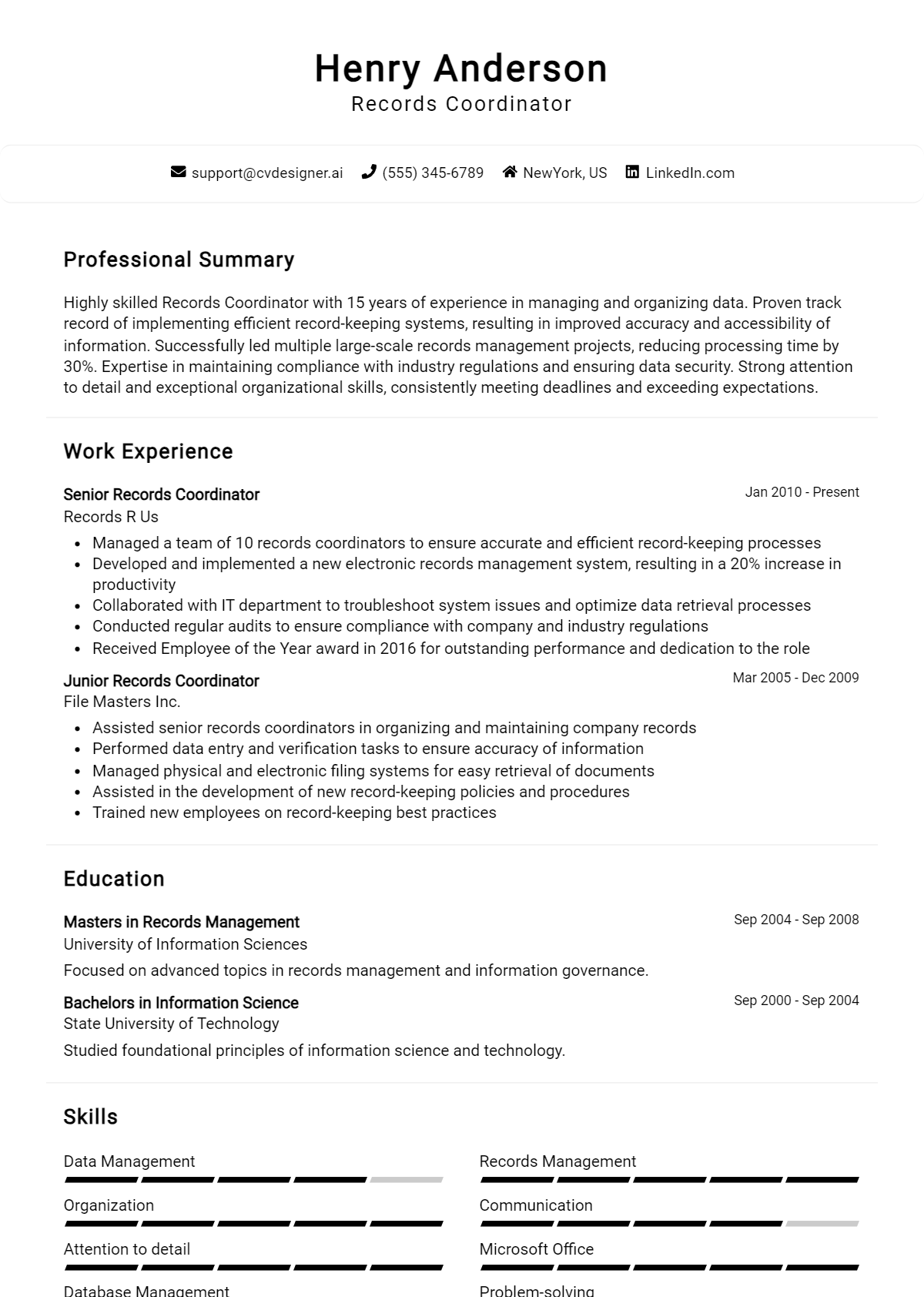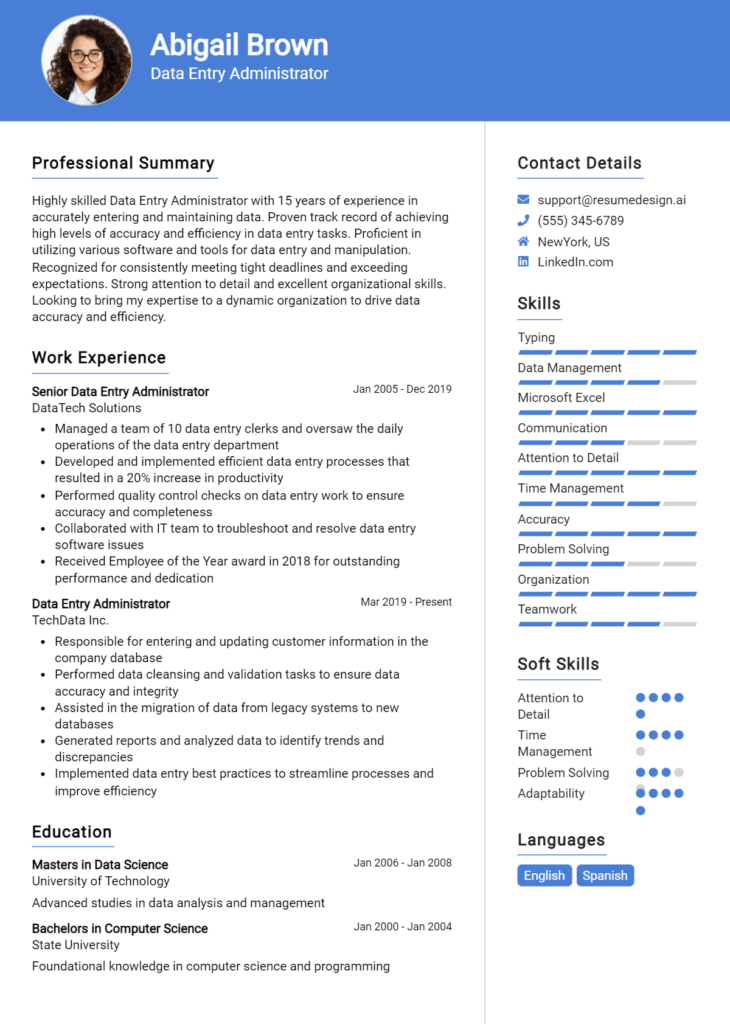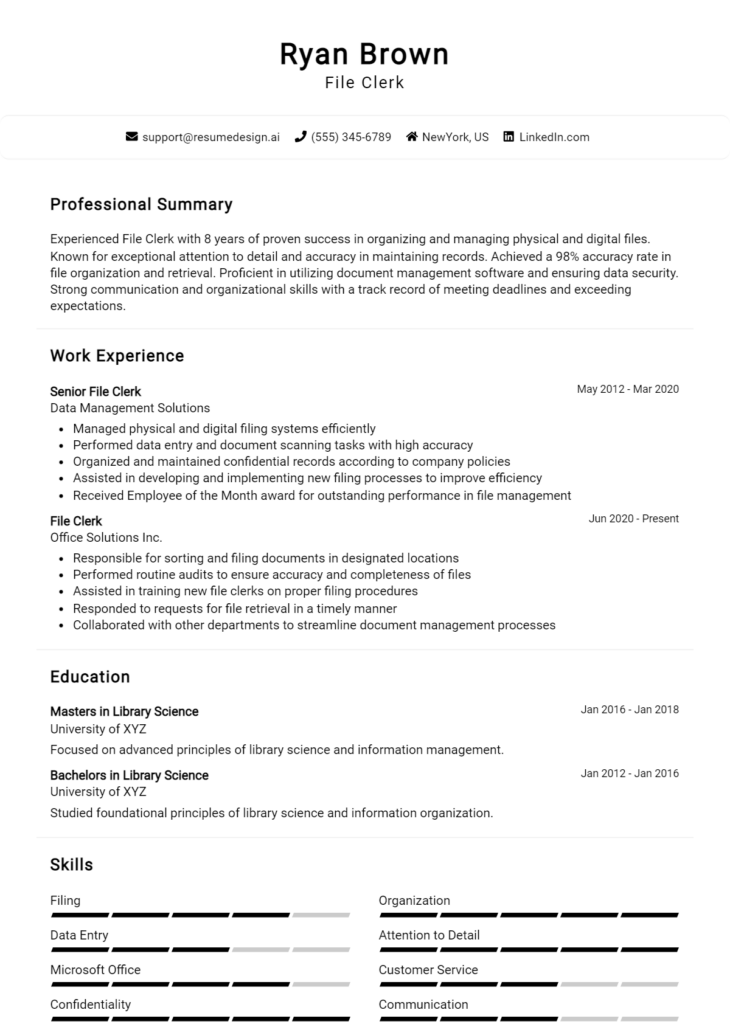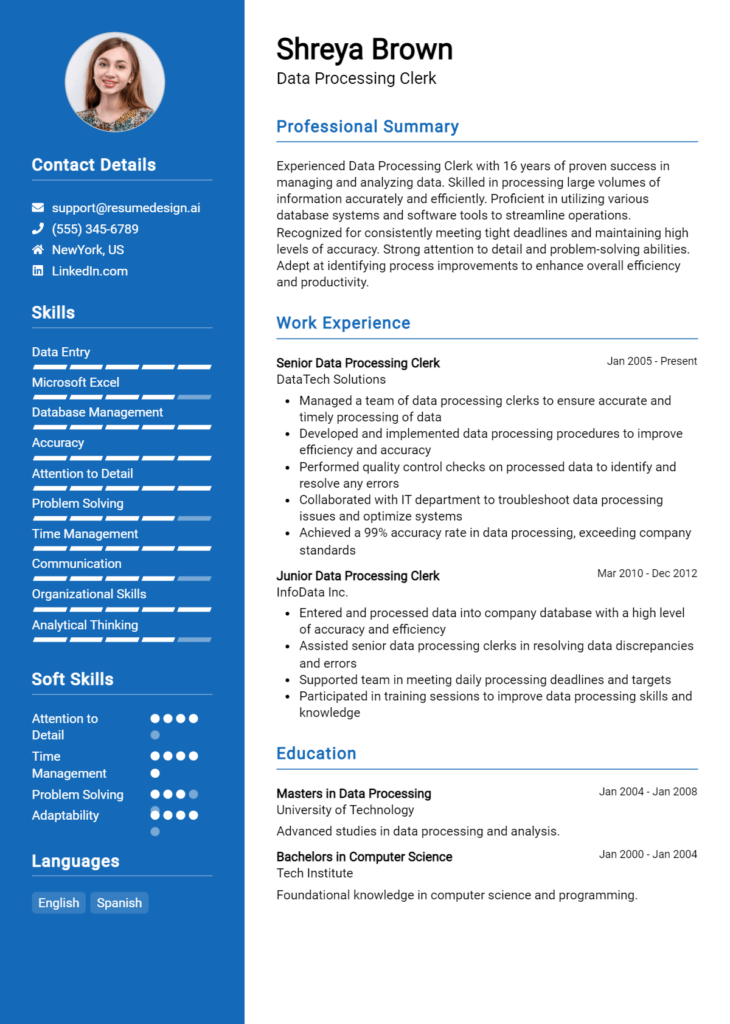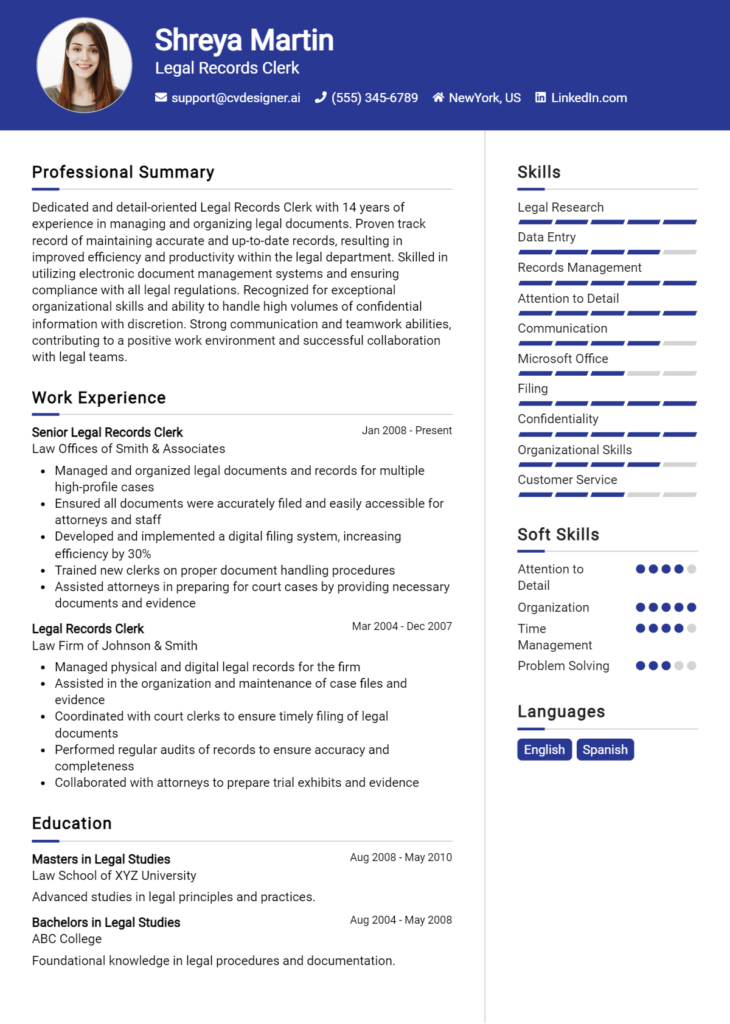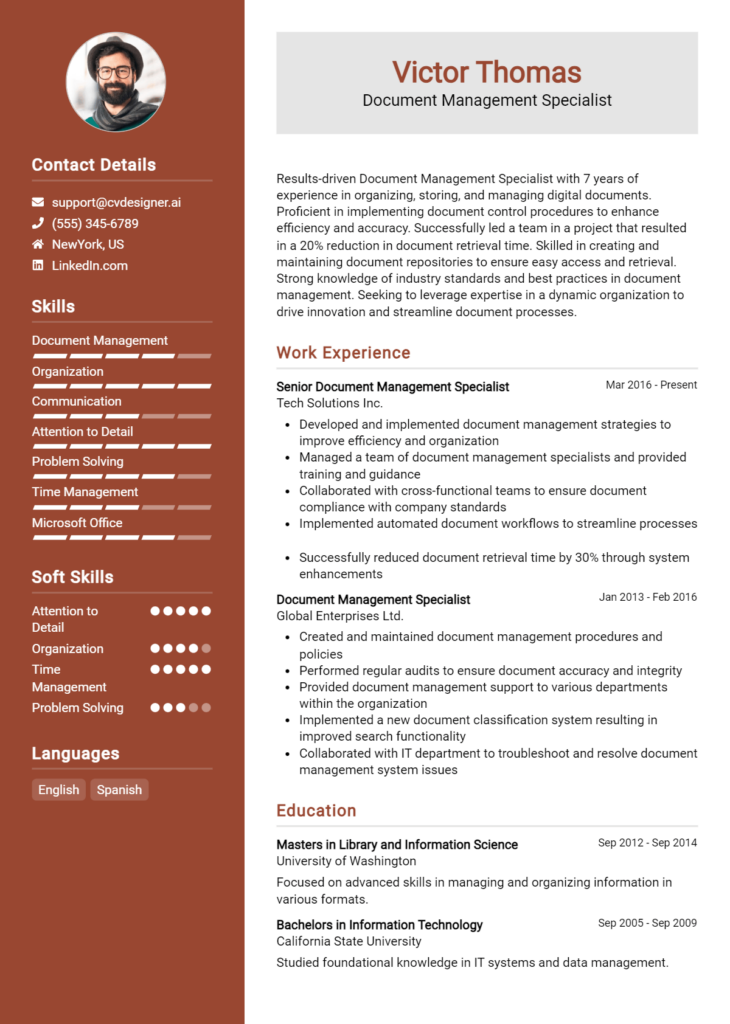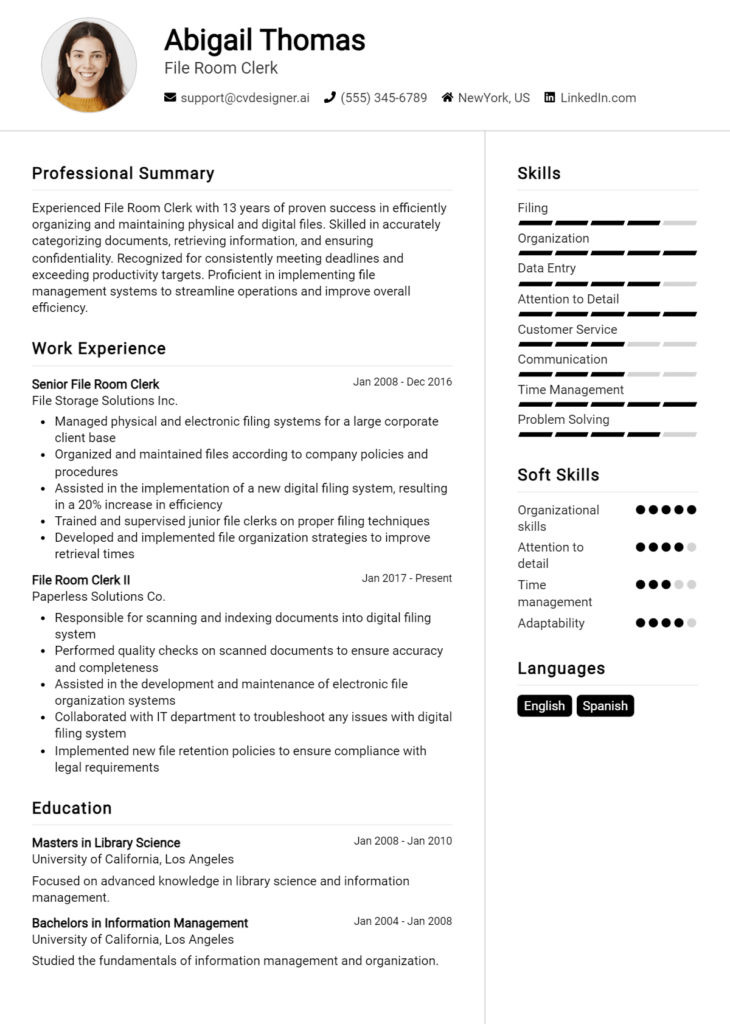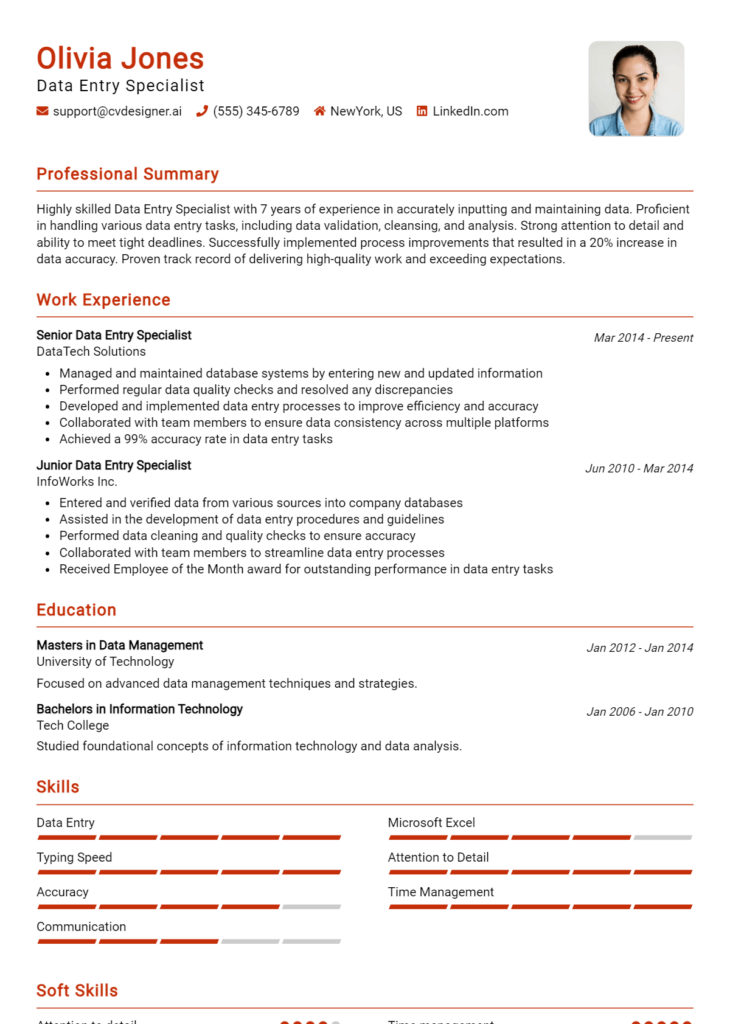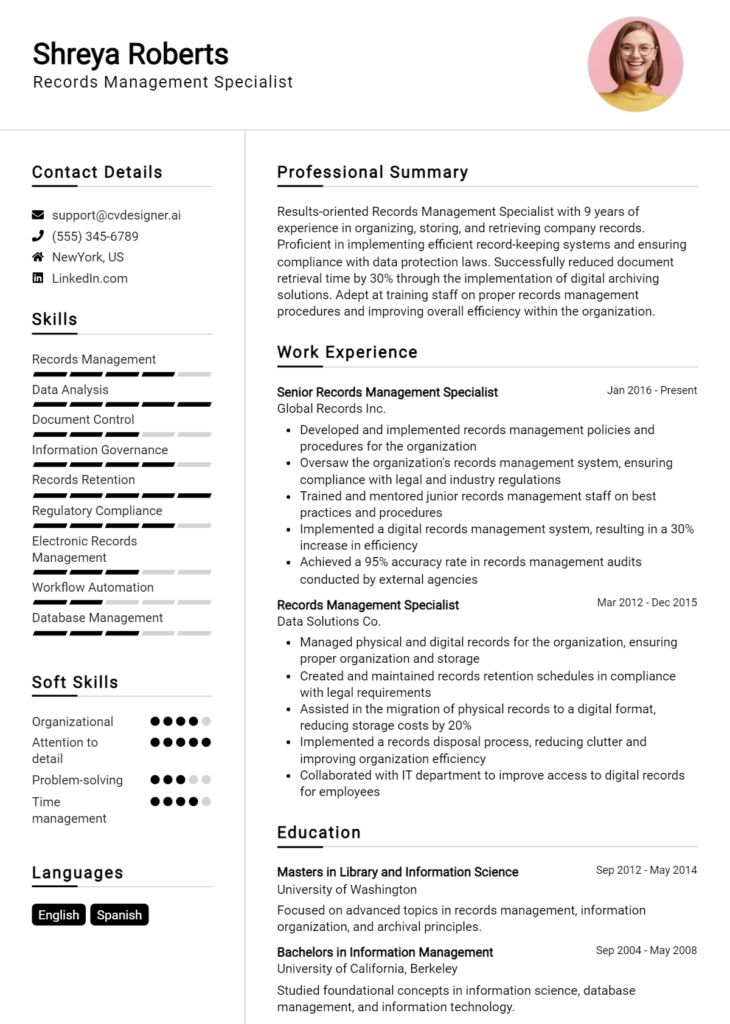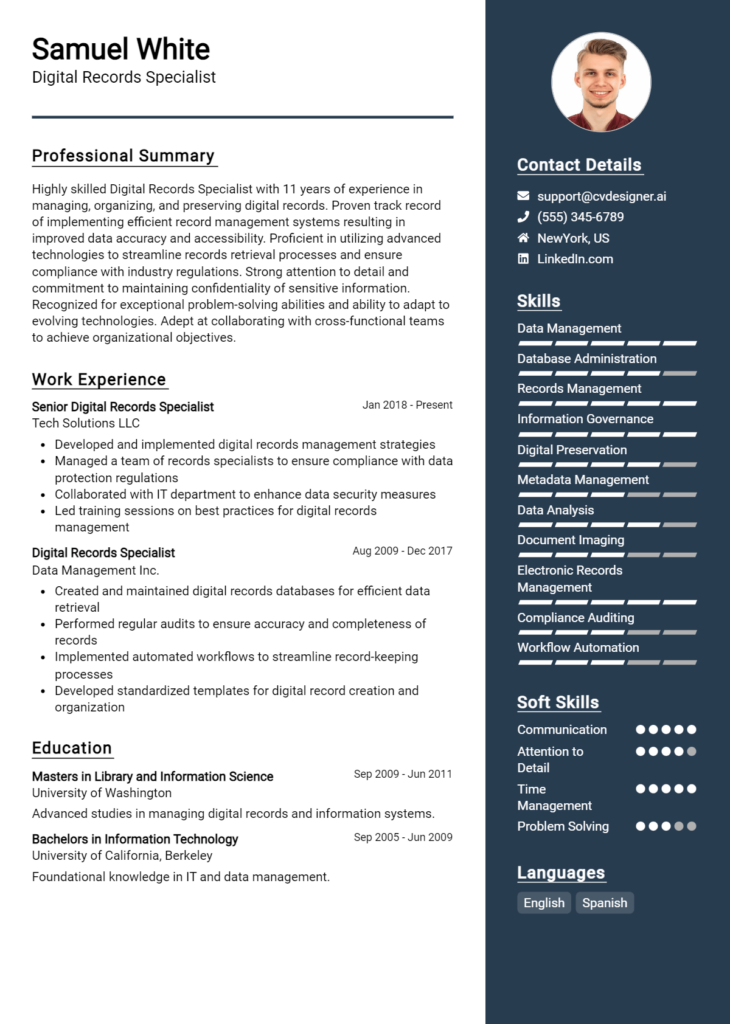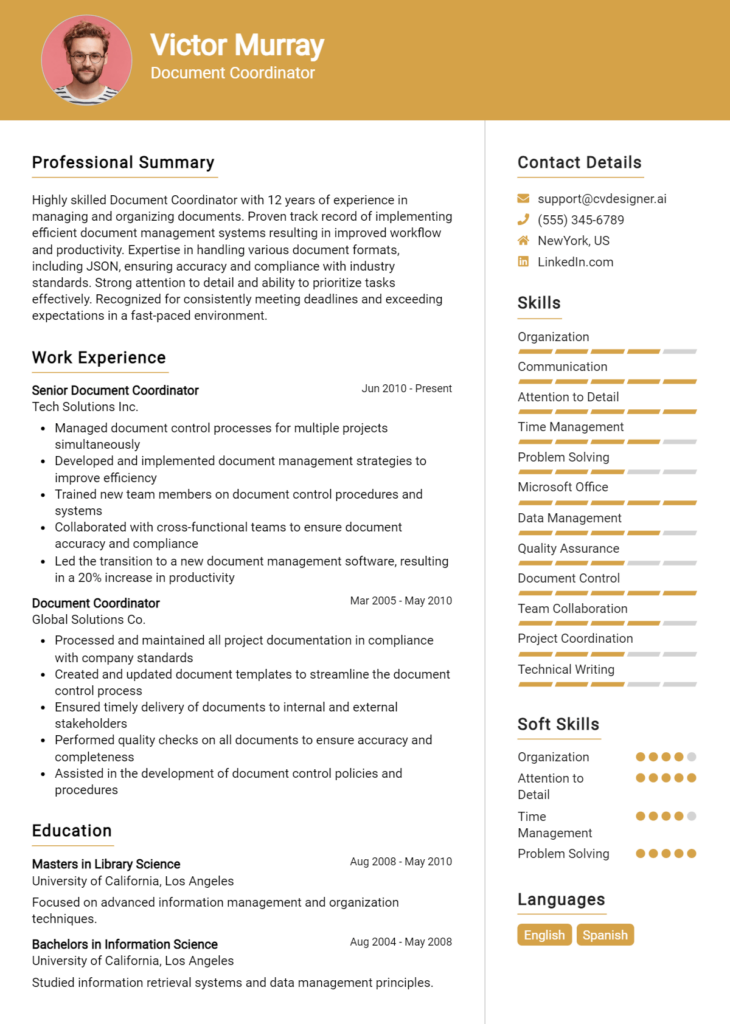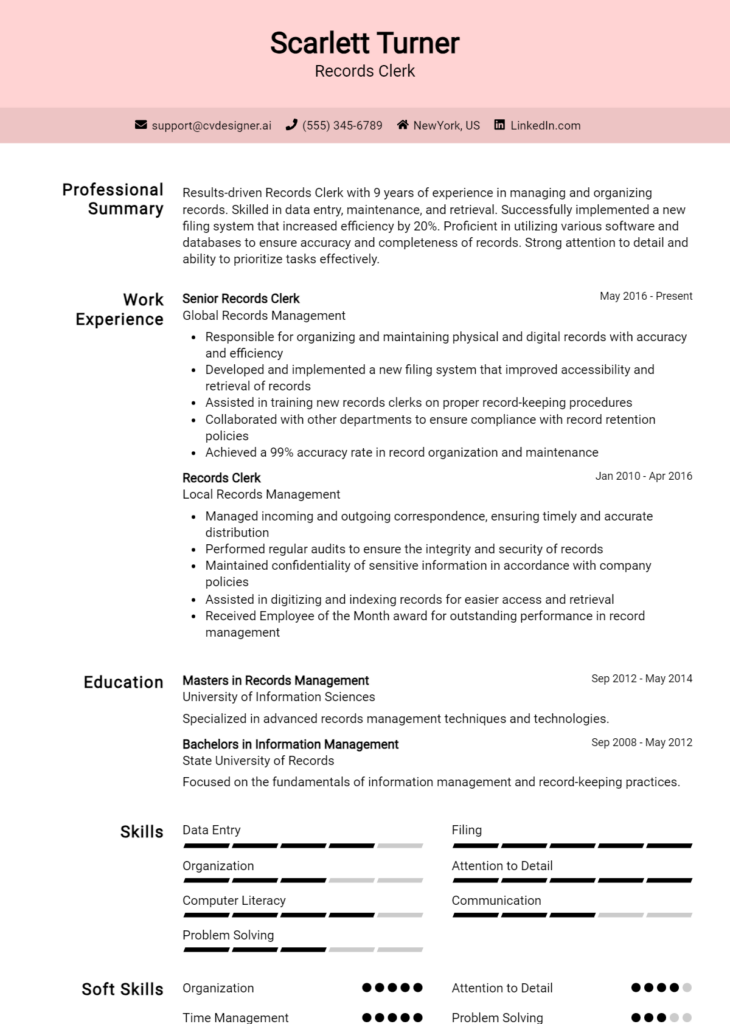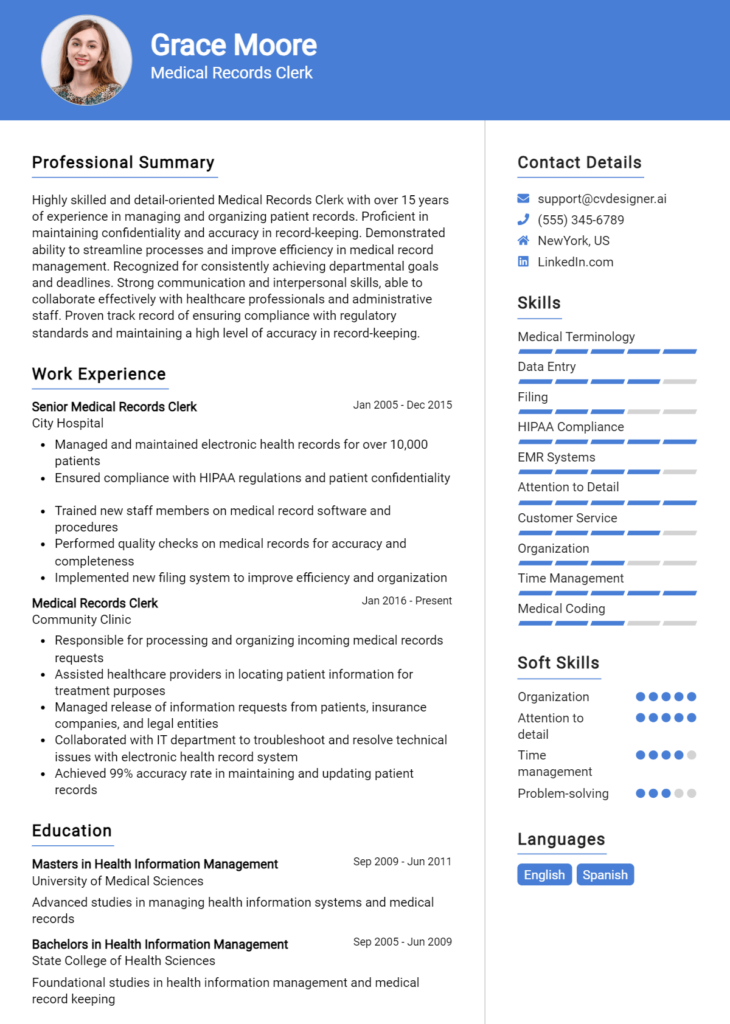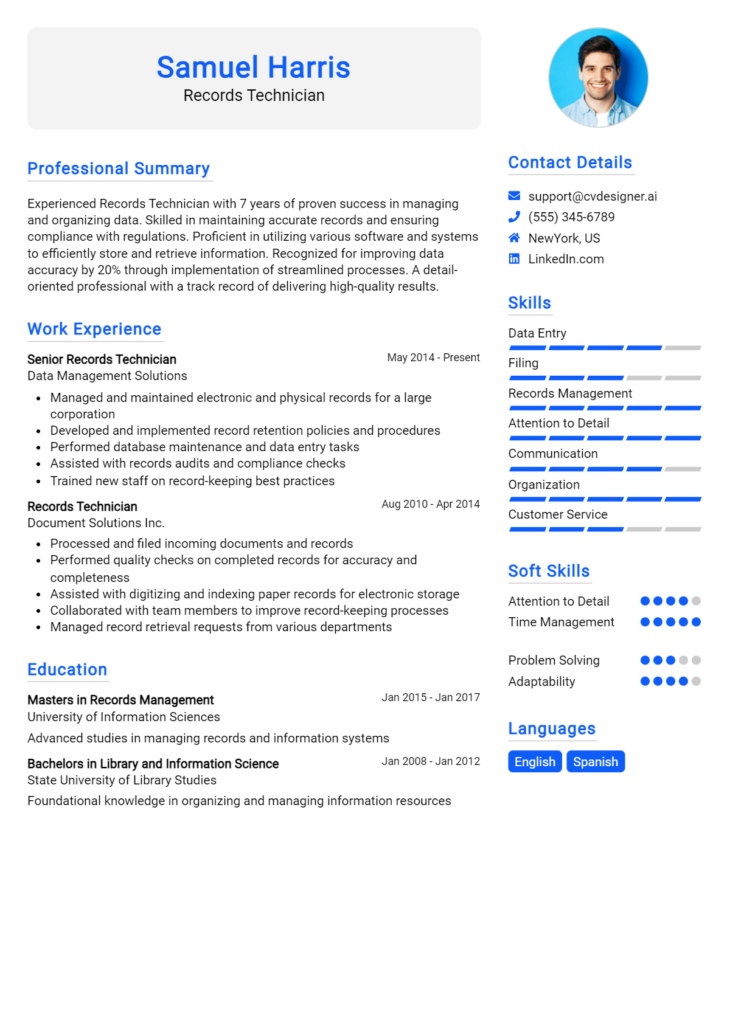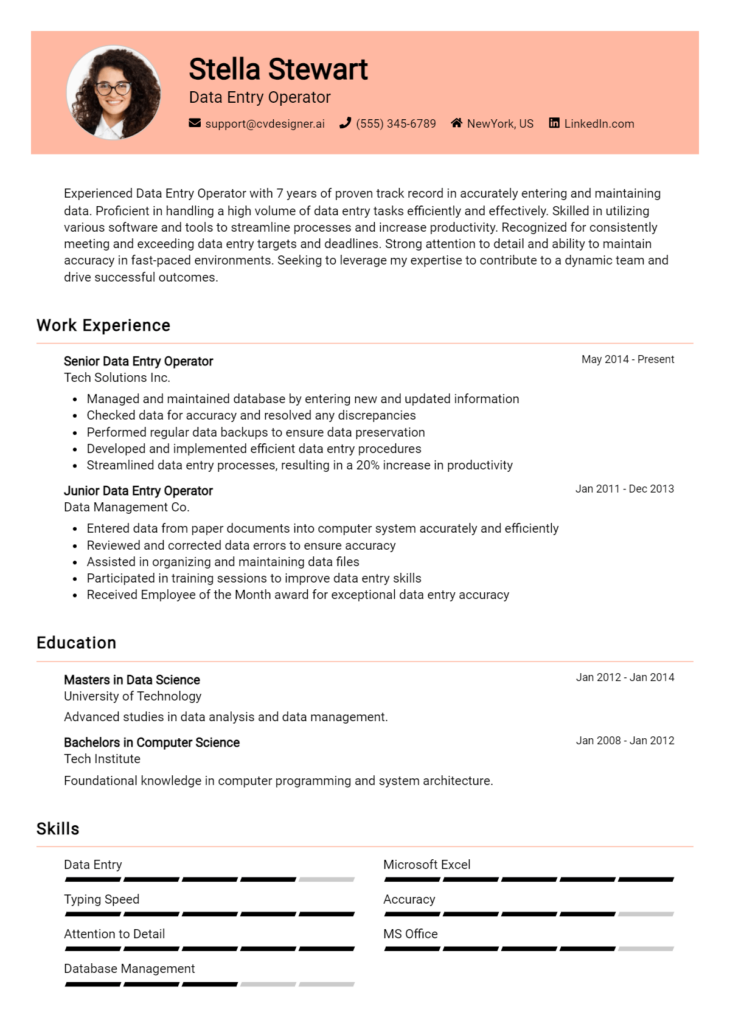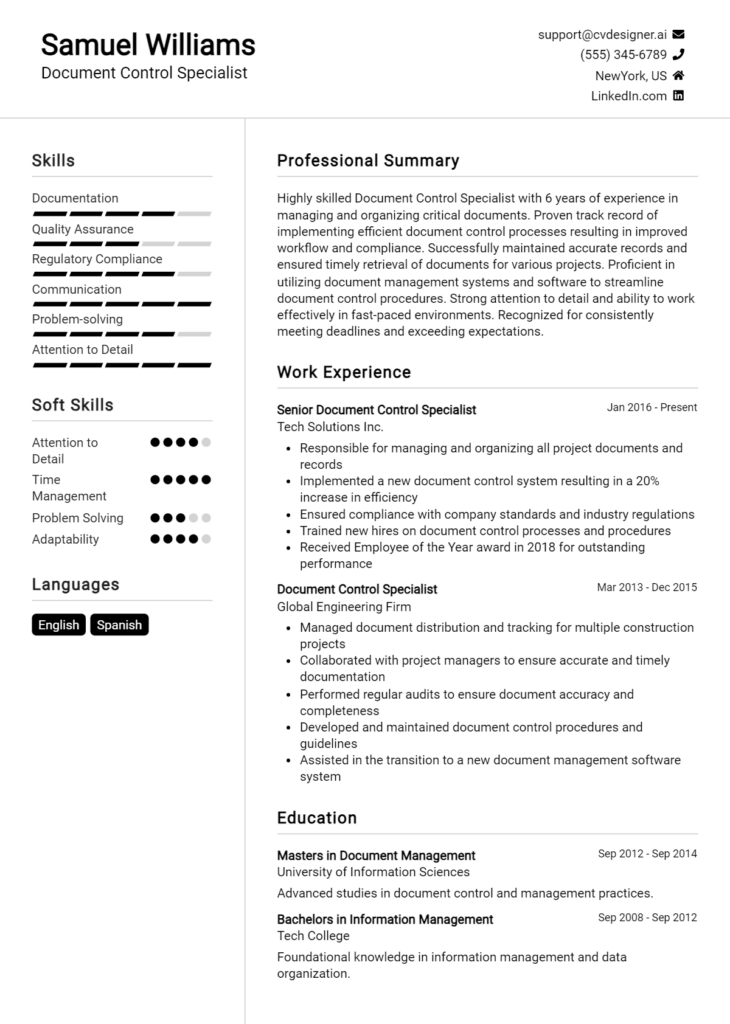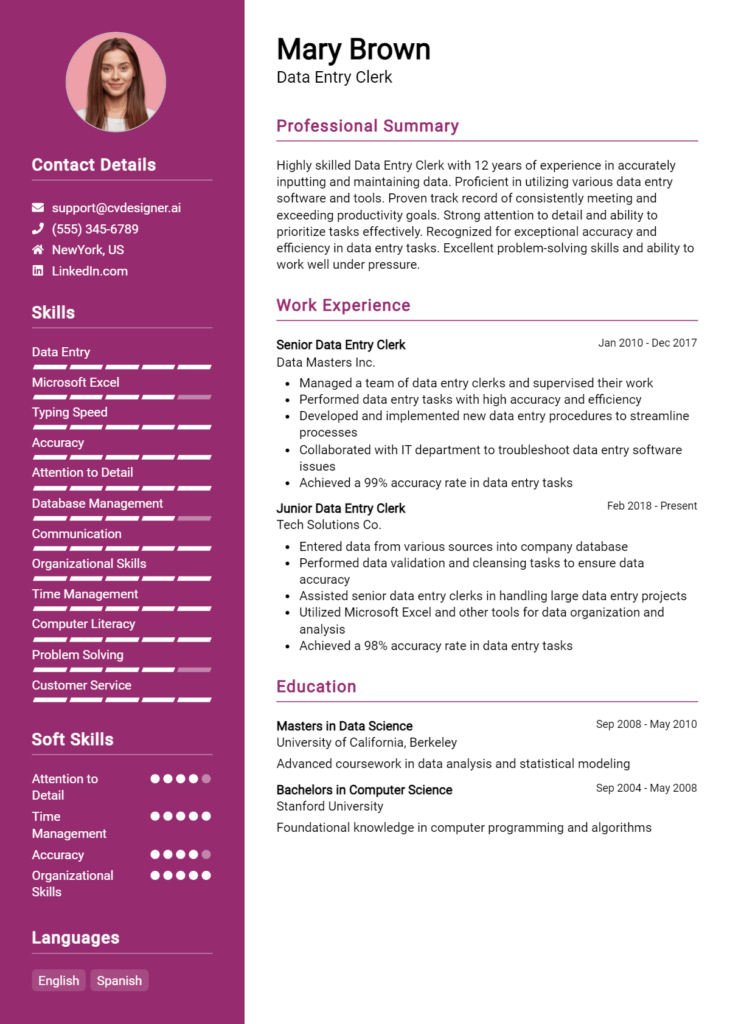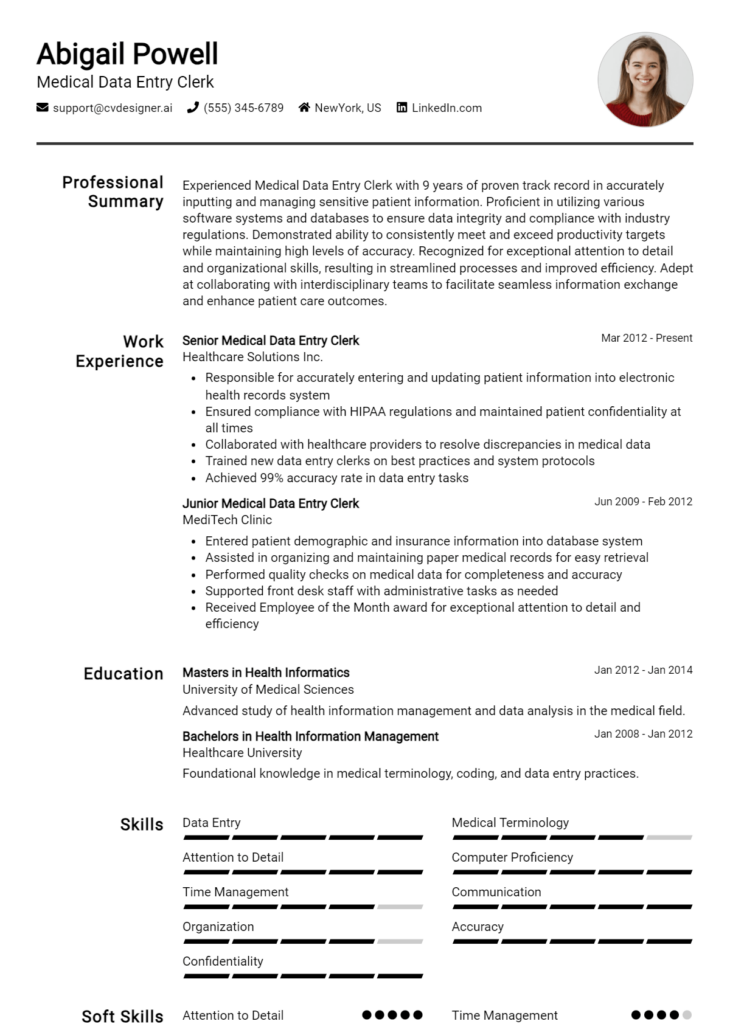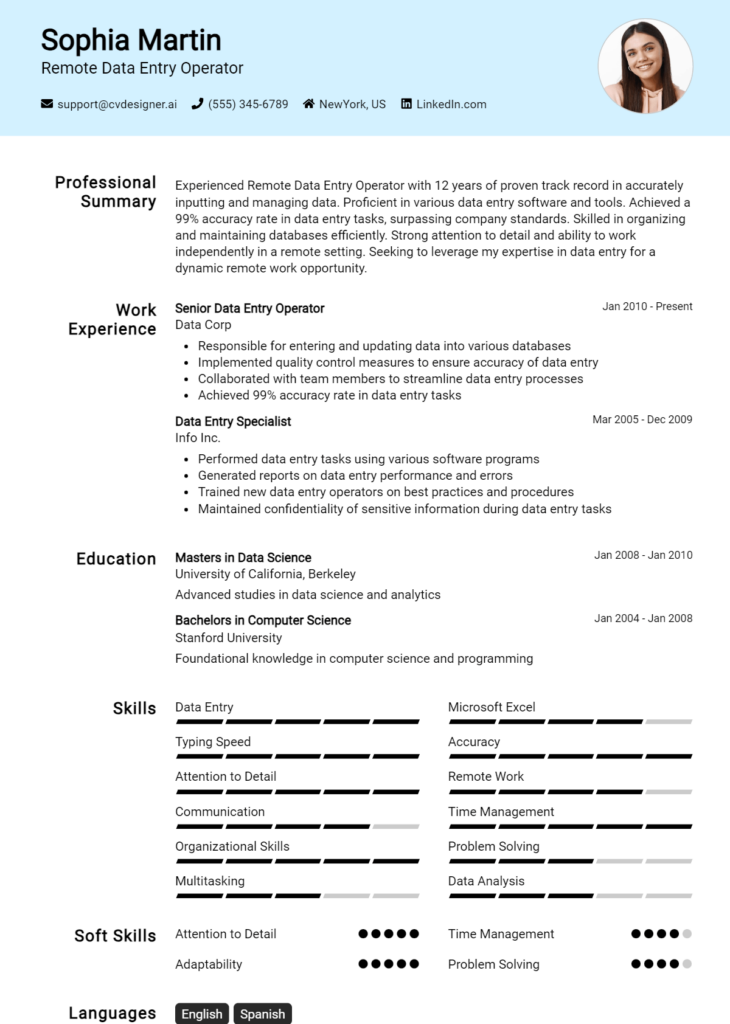Records Coordinator Core Responsibilities
A Records Coordinator plays a crucial role in managing and organizing documents across various departments, ensuring that information is accessible and secure. Key responsibilities include maintaining records systems, ensuring compliance with regulations, and facilitating communication between departments. Necessary skills encompass technical aptitude with record-keeping software, operational efficiency, and strong problem-solving abilities. These competencies contribute significantly to organizational goals by enhancing data integrity and workflow efficiency. A well-structured resume can effectively highlight these qualifications, showcasing a candidate's value to potential employers.
Common Responsibilities Listed on Records Coordinator Resume
- Maintain and organize electronic and physical records systems.
- Ensure compliance with legal and regulatory requirements.
- Coordinate with departments to streamline document flow.
- Assist in the implementation of record management policies.
- Conduct regular audits of records for accuracy and completeness.
- Train staff on proper record-keeping procedures.
- Facilitate the retrieval and dissemination of records.
- Manage requests for information and data retrieval.
- Develop and maintain filing systems for easy access.
- Implement data entry processes to enhance operational efficiency.
- Collaborate with IT to ensure system functionality and security.
- Resolve discrepancies in records and documentation.
High-Level Resume Tips for Records Coordinator Professionals
In today's competitive job market, a well-crafted resume is crucial for Records Coordinator professionals aiming to make a strong first impression on potential employers. Your resume serves as a snapshot of your skills, experiences, and achievements, reflecting your ability to manage and maintain records efficiently. It is essential that your resume not only highlights your qualifications but also demonstrates your understanding of the nuances involved in records management. In this guide, we will provide practical and actionable resume tips specifically tailored for Records Coordinator professionals to help you stand out from the crowd.
Top Resume Tips for Records Coordinator Professionals
- Tailor your resume to the job description by incorporating relevant keywords and phrases that align with the specific requirements of the position.
- Showcase your relevant experience in records management, emphasizing roles that involved data entry, document organization, and compliance with regulations.
- Quantify your achievements by including metrics such as the number of records managed, percentage improvements in efficiency, or successful audits you conducted.
- Highlight industry-specific skills such as familiarity with records management software, knowledge of data privacy laws, and organizational skills.
- Use action verbs to describe your responsibilities and achievements, making your contributions clear and impactful.
- Include a summary statement at the top of your resume that encapsulates your expertise, skills, and career goals in records management.
- Incorporate relevant certifications or training related to records management to demonstrate your commitment to professional development.
- Maintain a clean and organized layout that reflects your attention to detail, making it easy for hiring managers to navigate your resume.
- Proofread your resume multiple times to eliminate errors and ensure clarity, as attention to detail is critical in records coordination.
By implementing these tips, you can significantly increase your chances of landing a job in the Records Coordinator field. A polished resume that effectively showcases your strengths and achievements will not only capture the attention of hiring managers but also position you as a strong candidate ready to contribute to their organization.
Why Resume Headlines & Titles are Important for Records Coordinator
In the competitive field of records management, a well-crafted resume headline or title is essential for a Records Coordinator. This pivotal element serves as a first impression, immediately capturing the attention of hiring managers and summarizing a candidate's key qualifications in one impactful phrase. A strong headline should be concise, relevant, and directly related to the job being applied for, effectively setting the tone for the rest of the resume. By highlighting vital skills or experience right at the top, candidates can differentiate themselves in a crowded applicant pool, making it more likely that their resume will be thoroughly reviewed.
Best Practices for Crafting Resume Headlines for Records Coordinator
- Keep it concise: Aim for one impactful phrase that encapsulates your qualifications.
- Be role-specific: Tailor your headline to reflect the specific position you are applying for.
- Highlight key skills: Include relevant skills that match the job description.
- Use action words: Start with strong verbs to convey confidence and competence.
- Include relevant experience: Mention years of experience or notable achievements.
- Focus on results: Emphasize any outcomes or successes from your previous roles.
- Avoid jargon: Use clear language that is easily understood by hiring managers.
- Make it unique: Stand out by using a headline that reflects your individual strengths.
Example Resume Headlines for Records Coordinator
Strong Resume Headlines
"Detail-Oriented Records Coordinator with 5+ Years of Experience in Document Management"
“Proven Records Management Specialist Focused on Improving Data Accuracy and Compliance”
“Efficient Records Coordinator Skilled in Streamlining Processes and Enhancing Retrieval Systems”
Weak Resume Headlines
“Resume for Records Coordinator”
“Experienced Worker Looking for Job”
The strong headlines are effective because they are specific, highlight relevant skills and experience, and communicate a clear value proposition to potential employers. They immediately showcase the candidate's qualifications and set a positive tone for the resume. In contrast, the weak headlines fail to impress because they are vague and generic, lacking the specificity and impact needed to stand out in a competitive job market. These bland titles do not convey the candidate's strengths or alignment with the role, making it less likely for hiring managers to take notice.
Writing an Exceptional Records Coordinator Resume Summary
A well-crafted resume summary is critical for a Records Coordinator as it serves as the first impression for hiring managers. This brief yet powerful introduction encapsulates key skills, relevant experiences, and notable accomplishments that pertain directly to the role. A strong resume summary can quickly capture attention, making it easier for hiring managers to see the value a candidate brings to the table. It should be concise, impactful, and tailored specifically to the job being applied for, effectively setting the tone for the rest of the resume.
Best Practices for Writing a Records Coordinator Resume Summary
- Quantify Achievements: Use numbers and statistics to demonstrate the impact of your work.
- Focus on Relevant Skills: Highlight skills that align with the job description, such as data management and organization.
- Be Concise: Limit your summary to 2-4 sentences, ensuring clarity and brevity.
- Use Action Verbs: Start sentences with strong action verbs to convey competence and proactivity.
- Tailor for Each Job: Customize your summary to reflect the specific requirements and language of the job posting.
- Showcase Industry Knowledge: Include terminology and concepts relevant to records management to demonstrate expertise.
- Highlight Soft Skills: Mention interpersonal skills like communication and teamwork, which are essential in collaborative environments.
- Maintain Professional Tone: Use formal language and avoid slang or overly casual expressions.
Example Records Coordinator Resume Summaries
Strong Resume Summaries
Detail-oriented Records Coordinator with over 5 years of experience in managing digital and physical archives, resulting in a 30% increase in retrieval efficiency. Proficient in implementing record management systems and ensuring compliance with industry regulations.
Proactive Records Coordinator skilled in data organization and document control, successfully reducing record retrieval time by 25% through the introduction of streamlined processes. Experienced in training staff on data management best practices.
Results-driven Records Coordinator with a proven track record of maintaining accurate records for over 10,000 files, achieving a 98% accuracy rate during audits. Expertise in electronic records management systems and regulatory compliance.
Weak Resume Summaries
I have experience in record keeping and am looking for a position in a company where I can grow.
Records Coordinator with some skills in organizing information and maintaining files. I enjoy working with documents.
The strong resume summaries exemplify clarity, specificity, and measurable achievements, showcasing the candidate's expertise and direct relevance to the Records Coordinator role. In contrast, the weak summaries are vague and lack quantifiable outcomes, failing to provide a distinct picture of the candidate's capabilities or contributions. This highlights the importance of crafting a summary that effectively communicates value and aligns with the job requirements.
Work Experience Section for Records Coordinator Resume
The work experience section of a Records Coordinator resume plays a pivotal role in demonstrating a candidate's qualifications and fit for the position. It serves as a showcase of technical skills, highlighting the ability to manage records efficiently and effectively, while also illustrating the candidate's capacity to lead teams and deliver high-quality outcomes. By quantifying achievements and aligning past experiences with industry standards, candidates can create a compelling narrative that resonates with hiring managers and sets them apart from other applicants.
Best Practices for Records Coordinator Work Experience
- Use action verbs to clearly describe your responsibilities and contributions.
- Quantify achievements with specific metrics (e.g., reduced processing time by 30%).
- Highlight technical skills relevant to records management systems and software.
- Demonstrate collaboration by mentioning cross-departmental projects and teamwork.
- Align your experience with industry standards and best practices in records management.
- Focus on outcomes that showcase your ability to improve processes and efficiency.
- Include relevant certifications or training that bolster your expertise.
- Tailor your work experience to match the specific job description and requirements.
Example Work Experiences for Records Coordinator
Strong Experiences
- Implemented a new electronic records management system, which increased data retrieval speed by 40% and improved compliance with regulatory standards.
- Successfully led a team of 5 in a project to digitize over 10,000 historical records, resulting in a 25% reduction in physical storage costs.
- Streamlined the records retention process, reducing the average processing time from 10 days to 3 days, enhancing overall operational efficiency.
- Collaborated with IT to develop a training program for staff, improving records management practices and achieving a 95% satisfaction rate among participants.
Weak Experiences
- Helped with filing and organizing records.
- Worked on various tasks related to records management.
- Assisted team members with their projects and responsibilities.
- Participated in meetings about records management issues.
The examples provided illustrate the difference between strong and weak experiences. Strong experiences are characterized by specific, quantifiable outcomes and demonstrate leadership, technical expertise, and collaboration in meaningful projects. In contrast, weak experiences lack detail and do not convey the candidate's impact or contributions, making it challenging for hiring managers to assess their qualifications effectively.
Education and Certifications Section for Records Coordinator Resume
The education and certifications section in a Records Coordinator resume plays a pivotal role in showcasing a candidate's academic background and commitment to the field. This section not only highlights the relevant degrees and industry-recognized certifications that demonstrate a solid foundation in records management, but it also reflects the candidate's dedication to continuous learning and professional development. By including pertinent coursework, specialized training, and certifications, candidates can significantly enhance their credibility and align themselves with the specific requirements of the job role, making a compelling case for their qualifications.
Best Practices for Records Coordinator Education and Certifications
- Focus on relevant degrees such as a Bachelor’s in Information Management or a related field.
- Include industry-recognized certifications like Certified Records Manager (CRM) or Certified Information Professional (CIP).
- Provide detailed descriptions of relevant coursework that aligns with records management skills.
- Highlight any specialized training in document management systems or compliance regulations.
- Keep the section concise but informative; avoid excessive detail that may dilute key information.
- Order credentials in reverse chronological order, starting with the most recent qualification.
- Emphasize any ongoing education efforts, such as workshops or seminars related to records management.
- Avoid listing irrelevant certifications or degrees that do not pertain to the records management field.
Example Education and Certifications for Records Coordinator
Strong Examples
- Bachelor of Science in Information Management, University of XYZ, 2020
- Certified Records Manager (CRM), Institute of Certified Records Managers, 2022
- Coursework in Archival Science and Digital Records Management, University of XYZ
- Certificate in Data Privacy and Compliance, National Association for Information Governance, 2021
Weak Examples
- Associate Degree in General Studies, Community College of ABC, 2018
- Certification in Microsoft Office Suite, 2019
- High School Diploma from XYZ High School, 2015
- Outdated certification in Records Management from a defunct institution, 2015
The strong examples provided demonstrate a clear alignment with the competencies required for a Records Coordinator role, showcasing relevant degrees and certifications that are directly applicable to the industry. In contrast, the weak examples reflect qualifications that lack relevance to records management, such as general studies or outdated certifications, which do not enhance the candidate's credibility in this specialized field. This distinction underscores the importance of presenting well-chosen educational qualifications to enhance job prospects.
Top Skills & Keywords for Records Coordinator Resume
As a Records Coordinator, having the right skills is crucial for ensuring efficient management of documents and data within an organization. A well-crafted resume that highlights both hard and soft skills can significantly enhance your chances of standing out to potential employers. Soft skills, such as communication and organization, complement the technical abilities required for the role, ensuring that you can effectively manage records while also collaborating with team members. By showcasing your diverse skill set, you demonstrate your capability to handle the responsibilities of a Records Coordinator smoothly and efficiently. For more insights on how to effectively present your skills, visit our guide on skills and ensure your work experience reflects your qualifications.
Top Hard & Soft Skills for Records Coordinator
Soft Skills
- Attention to Detail
- Effective Communication
- Organization
- Time Management
- Problem-Solving
- Adaptability
- Team Collaboration
- Critical Thinking
- Customer Service Orientation
- Interpersonal Skills
- Conflict Resolution
- Initiative
- Reliability
- Flexibility
- Ethical Judgment
Hard Skills
- Records Management Systems (RMS)
- Data Entry and Database Management
- Document Control Procedures
- Knowledge of Regulatory Compliance
- Metadata Management
- Archiving and Retrieval Techniques
- Familiarity with Electronic Document Management (EDM) software
- Microsoft Office Suite (Excel, Word, Access)
- File Organization and Classification
- Basic IT Troubleshooting
- Knowledge of Privacy Laws (e.g., GDPR, HIPAA)
- Quality Assurance and Auditing
- Data Backup and Recovery Procedures
- Report Generation and Analysis
- Project Management Principles
- Inventory Management
- Statistical Analysis Techniques
Stand Out with a Winning Records Coordinator Cover Letter
As an experienced Records Coordinator with a proven track record in managing and maintaining comprehensive records systems, I am excited to apply for the Records Coordinator position at [Company Name]. My background in data management, coupled with my meticulous attention to detail and organizational skills, makes me a perfect fit for this role. I am eager to contribute my expertise in ensuring the efficient and accurate handling of records, which is vital for compliance and operational success in any organization.
In my previous role at [Previous Company Name], I successfully implemented a new electronic records management system that improved retrieval times by 30% and significantly reduced physical storage needs. My responsibilities included overseeing document processing, ensuring compliance with regulatory requirements, and conducting regular audits of our records to maintain accuracy. Through effective collaboration with cross-functional teams, I was able to streamline processes, enhance data integrity, and provide training to staff on best practices in records management. I am confident that my proactive approach and problem-solving skills will add value to your team.
I am particularly drawn to [Company Name] because of your commitment to innovation and excellence in [specific industry or field]. I admire your focus on [specific company values or initiatives], and I believe my skills in records coordination align well with your goals. I am excited about the opportunity to contribute to your organization by ensuring that your records management processes are efficient, compliant, and supportive of your strategic objectives.
Thank you for considering my application for the Records Coordinator position. I look forward to the opportunity to discuss how my experience and passion for records management can benefit [Company Name]. I am eager to bring my skills to your team and help facilitate the seamless operation of your records management system.
Common Mistakes to Avoid in a Records Coordinator Resume
When crafting a resume for the position of Records Coordinator, it's crucial to present your skills and experience effectively. However, many applicants make common mistakes that can diminish their chances of securing an interview. Understanding these pitfalls can help you create a standout resume that accurately reflects your qualifications and attention to detail, which are essential in this role.
Neglecting to Tailor the Resume: Failing to customize your resume for the specific job can make it appear generic, diminishing your connection to the role.
Overusing Jargon: While industry-specific terminology can demonstrate expertise, excessive jargon can alienate readers who may not be familiar with certain terms.
Ignoring Formatting: A cluttered or inconsistent layout can make your resume difficult to read. Use clear headings, bullet points, and consistent font styles to enhance readability.
Omitting Relevant Experience: Not including relevant experience, even if it’s in a different role or industry, can lead to a missed opportunity to showcase transferable skills.
Lack of Quantifiable Achievements: Instead of simply listing duties, it's important to highlight accomplishments with specific metrics or outcomes, which can provide tangible evidence of your capabilities.
Using Passive Language: Phrasing your experiences in a passive voice can undermine the impact of your contributions. Use active language to convey your role more assertively.
Failing to Proofread: Spelling and grammatical errors can give the impression of carelessness. Thorough proofreading is essential to ensure professionalism.
Not Highlighting Technical Skills: As a Records Coordinator, proficiency in record management systems and software is vital. Failing to highlight these skills can make you seem less qualified.
Conclusion
As a Records Coordinator, your role is vital in managing and organizing company documents and records efficiently. Key responsibilities include maintaining accurate filing systems, ensuring compliance with legal standards, and facilitating easy access to information. Attention to detail, strong organizational skills, and proficiency in record-keeping software are essential traits for success in this position.
In this fast-paced digital age, the importance of a polished and professional resume cannot be overstated. It serves as your first impression to potential employers and can significantly impact your job search. To enhance your chances of landing your desired role, it's crucial to ensure your resume effectively highlights your skills and experiences relevant to the Records Coordinator position.
We encourage you to take action now by reviewing your Records Coordinator resume. Make sure it showcases your qualifications and aligns with industry standards. To assist you in this process, consider utilizing the following resources:
- Explore a variety of resume templates to find a design that suits your style.
- Use the resume builder for an easy and guided way to create your resume.
- Check out resume examples for inspiration on how to effectively present your skills and accomplishments.
- Don’t forget to craft a compelling cover letter using our cover letter templates to further strengthen your application.
By leveraging these tools, you can create a standout resume that captures the attention of hiring managers and sets you on the path to a successful career as a Records Coordinator. Take the first step today!

